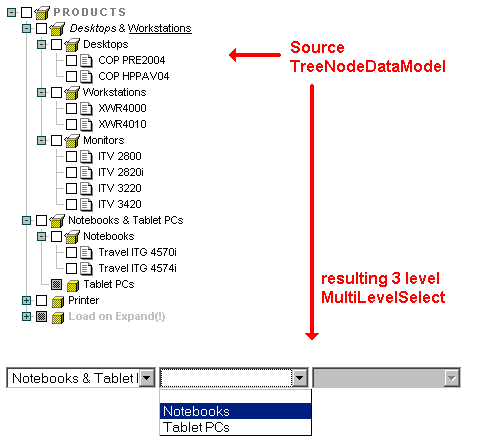| Attribute | Type | Description | Req. | RTExp |
| disabled | boolean |
This attribute can be used to disable the control element.
It then does not accept any user inputs and does not generate
any control element events.
| |
|
| id | String |
The name of a page scope JSP bean that will contain
the current element.
Using the given Id, the variable can be
accessed in scripting expressions in the tag Body.
The id mus be a string lteral because the JSP
compiler generates a variable withthis name at compile
time
Annotation:
A valid Java identifier must be given.
| |
|
| levels | Integer |
Specifies the hierarchy level and the number of select
boxes displayed.
If the depth of the tree is greater then the number
specified for the levels to display then the last select
element will contain all the rest of the items within the
tree structure.
| |
|
| name | String |
Specifies the name of the Java-Bean.
The Java-Bean must be stored in the given scope.
When the tag is surrounded by a Struts <html:form> tag,
no Bean Name need be specified. In this case, the Java-Bean
is drawn via a property of the Struts Form Bean.
Annotation:
A valid Java identifier must be given.
| |
|
| onblur | String |
Fires when the object loses the input focus.
Annotation:
JavaScript Code
| |
|
| onchange | String |
Fires when the contents of the object or selection have changed.
Annotation:
JavaScript Code
| |
|
| onclick | String |
Fires when the user clicks the left mouse button on the object.
Annotation:
JavaScript Code
| |
|
| oncontextmenu | String |
Fires when the user clicks the right mouse button in the client
area, opening the context menu.
Annotation:
JavaScript Code
| |
|
| ondblclick | String |
Fires when the user double-clicks the object.
Annotation:
JavaScript Code
| |
|
| onfocus | String |
Fires when the object receives focus.
Annotation:
JavaScript Code
| |
|
| onkeydown | String |
Fires when the user presses a key.
Annotation:
JavaScript Code
| |
|
| onkeypress | String |
Fires when the user presses an alphanumeric key.
Annotation:
JavaScript Code
| |
|
| onkeyup | String |
Fires when the user releases a key.
Annotation:
JavaScript Code
| |
|
| onmousedown | String |
Fires when the user clicks the object with either mouse button.
Annotation:
JavaScript Code
| |
|
| onmousemove | String |
Fires when the user moves the mouse over the object.
Annotation:
JavaScript Code
| |
|
| onmouseout | String |
Fires when the user moves the mouse pointer outside the boundaries
of the object.
Annotation:
JavaScript Code
| |
|
| onmouseover | String |
Fires when the user moves the mouse pointer into the object.
Annotation:
JavaScript Code
| |
|
| onmouseup | String |
Fires when the user releases a mouse button while the mouse is
over the object.
Annotation:
JavaScript Code
| |
|
| property | String |
Specifies the name of the property using which the Java-Bean
is to be accessed. This is generally only necessary when
the Java-Bean is associated with a Struts Form Bean.
Annotation:
A valid Java identifier must be given.
| |
|
| scope | HTTPScope |
This attribute shows the Scope in which the Java-Bean with
the actual display data can be found.
-
any
=
The Bean is searched for in ever Scope.
-
page
=
The Bean exists as a local variable in the JSP Page.
-
request
=
The Bean is in the HTTP-Request.
-
session
=
The Bean is in the HTTP-Session.
-
application
=
The Bean is in the Servletkontext.
| |
|
| selectableProperty | String |
Specifies the name of the property which determines if a
node can be selected by the user.
Each group within the tree needs to implement a corresponding
getter method which has to return an Boolean value.
| |
|
| size | Integer |
The number of visible options.
| |
|
| style | String |
An HTML-style can be directly specified with this attribute.
Annotation:
See HTML documentation for the attribute style.
| |
|
| styleId | String |
The HTML-id attribute of the element can be specified with this attribute.
Annotation:
See HTML documentation for the Attribute id.
| |
|
| tabindex | Integer |
Tabulator Index for this element.
| |
|
| tooltip | String |
A short descriptive text that is displayed when the user
moves the mouse over the element.
The character string is HTML-encoded before outputting.
| |
|
| value | String |
This attribute sets the initial displayed value of the field if it displays a textual or numerical value.
Annotation:
See HTML documentation for the attribute value.
| |
|


